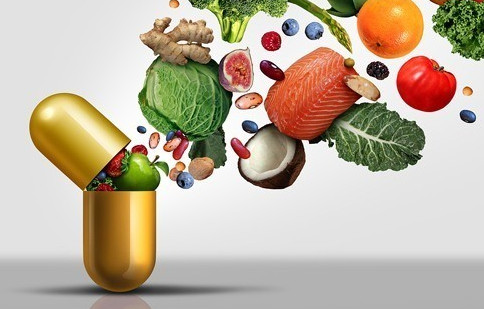Nutritional supplements can help you get enough of the essential elements your body needs to function properly, and others can reduce your risk of developing certain diseases, but they should not replace a well-balanced diet. Maintain a healthy diet. In this case, you should consume a variety of foods along with food supplements if necessary.
It is known that some nutritional supplements can improve general health and improve certain health conditions, such as calcium and vitamin D, which may help maintain bone strength and reduce bone loss with age. In addition to omega-3 fatty acids from fish oil, vitamin C, vitamin E, zinc, copper, lutein, and zeaxanthin may slow vision loss in people with macular degeneration.
According to a review published in Obstetrics & Gynecology, women of childbearing age should take 0.4 mg of folic acid per day to reduce their risk of fetal neural tube defects.

Dietary supplements have some disadvantages
Nutritional supplements should be avoided during pregnancy and breastfeeding, and children should not be given nutritional supplements unless they have been prescribed by a physician.
High doses of some nutrients can cause harm, since the body needs a certain amount of each nutrient, so very high amounts are not necessarily better, and taking more than what the body needs can be harmful. Taking high doses of vitamin B6 can damage the nervous system, and taking vitamin A, vitamin C, or vitamin E supplements during pregnancy can cause birth defects.
Supplements of selenium, boron, and iron can be toxic when taken in doses greater than the intestinal absorption capacity, and some people can tolerate doses of 5,000 to 25,000 mg of vitamin C daily. A large amount of it is taken.
Dietary supplement interactions with drugs
Some dietary supplements may interact with medications, some of which are listed below:
By reducing warfarin’s ability to thin the blood, vitamin K can prevent blood clots.
The effectiveness of some cancer chemotherapy can be reduced by antioxidant supplements such as vitamin C and vitamin E.
Blood thinners can be activated by vitamin E, increasing the risk of bruising and nosebleeds.
There is a possibility of vitamin A toxicity when used in acne medications such as isotretinoin and acitretin.
The effectiveness of certain antibiotics can be reduced by iron and calcium supplements.
Prior to, during, and after surgery, some nutritional supplements, such as vitamin A, vitamin D, and iron, may cause unwanted negative effects, so it is recommended to inform the doctor before taking any supplements.
It is essential to know that food supplements are intended to supplement the diet, not replace nutritious foods. Some groups may need food supplements because they cannot obtain the vitamins or minerals they need from their diets in sufficient amounts. Some of these categories include:
Women who are pregnant or lactating.
Vegetarians.
Allergies or intolerances to certain foods.
Elderly people
Those suffering from cancer, kidney disease, cardiovascular disease, and bone disease.
Vitamin D supplements are only required for breastfed babies.
Nutritionally deficient individuals.
Those suffering from diseases that impair the body’s ability to absorb nutrients.
Gastric bypass patients.
People who have difficulty preparing food, including adults and children.

Dietary supplements: what are they?
A dietary supplement is a substance that is taken in order to increase nutrient intake or to reduce the risk of certain health problems, such as osteoporosis and arthritis. The availability of dietary supplements in various forms, such as tablets, is widespread.
Do you prefer natural sources or supplements? :
Getting all the nutrients the body needs comes from a balanced diet, and nutritional supplements can help improve the diet if some nutrients are lacking, but they cannot replace it. Since the composition of food is very complex, it not only provides vitamins and minerals to the body, it also contains fiber, carbohydrates, proteins, fats, and phytochemicals. A wide range of nutrients that science has yet to fully identify, which work in concert with other foods to provide the benefits that healthy food offers.
While supplements can improve the health of some people, they are not beneficial for everyone, and some people are advised to avoid certain supplements, especially those with high doses, such as dietary supplements. If the recommended amount is exceeded or is exceeded for a long period of time, foods containing vitamin A, such as cod liver oil, may cause birth defects in the fetus.
You should always follow a healthy, balanced diet, carefully read the label on any dietary supplement package to ensure that it is suitable for your body and your health condition, and do not consume too many doses. You should also consult your healthcare provider before taking nutritional supplements. Nutrients from food and supplements can be balanced by doctors.
Nutritional supplement tips
The use of dietary supplements may not be necessary for all cases, and a doctor can determine whether dietary supplements are needed based on the individual’s condition. Although supplements are available over the counter, it is recommended to consult with a doctor first.
The supplement package label contains information about the active ingredients, nutrients, serving sizes, and amount of nutrients per serving.
You may get too much vitamin and mineral content from certain fortified foods, such as breakfast cereals and beverages, if you take nutritional supplements and eat fortified foods. Side effects can increase as a result.
Taking too many vitamins and minerals can cause side effects, especially in children. Avoid taking more than the recommended daily amount of nutrients.
Dietary supplement FAQs
Are nutritional supplements necessary for children?
Healthy children can meet their nutritional needs by following a varied diet, and nutritional supplements may be recommended for certain age groups and conditions. Those who follow a strict vegetarian diet are at greater risk of deficiency in important nutrients such as vitamin B12, calcium, iron, zinc, and vitamin D. Children and adolescents have different nutritional requirements than adults. Consult a specialist.
Are nutritional supplements necessary for athletes?
Food supplements can be a valuable addition to an athlete’s diet, but they should not be considered a replacement for a healthy diet. A few nutritional supplements have been scientifically proven to improve sports performance, and some of these supplements may improve recovery and performance in sports.
For athletes who use nutritional supplements, it is important to constantly review nutritional supplement research, since nutritional supplements are classified into several categories based on the results of research conducted on them, and from supplements that have been proven to be beneficial to athletes, such as creatine, protein, and amino acids.
Several nutritional supplements need more research to determine their effectiveness, and as we mentioned earlier, it’s best to consult your doctor before taking any new vitamin or supplement, since these ingredients can interact with others. Most medicines and vitamins are ineffective unless a person is deficient. To provide more energy for activities, a balanced diet and a healthy lifestyle should be followed.



I like that you pointed out how nutritional supplements can help you get enough of the essential elements your body needs to function properly. My health has been a bit poor lately and I think it is because I am lacking in some nutrients. I should not ignore this, so I probably need to start taking some health food.